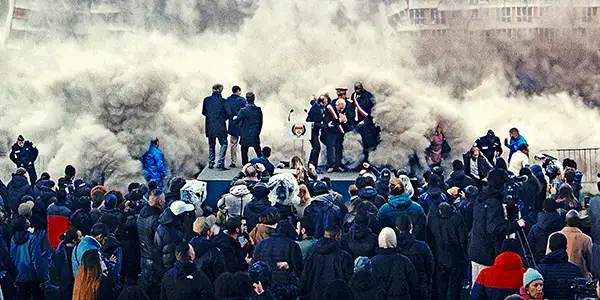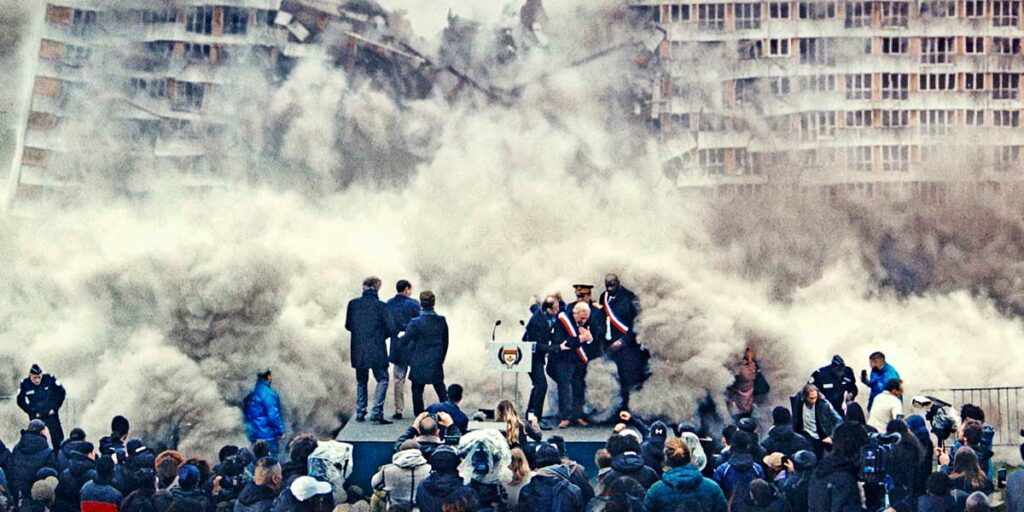With a strong and inspiring main character, Les Indésirables (Bâtiment5) is a provocative and authentic portrayal of modern-day France unlike any other.
Les Indésirables (Bâtiment5) is the second feature from Cannes Jury Prize winner Ladj Ly. After the Academy Award-nominated Les Misérables, the director has now set out to analyse the discrimination and political issues in France as a follow-up to his first film. At the beginning of the film, one of the characters who has just recently arrived in France, confesses that “this is not how I imagined France at all.” And for those of us who are not familiar with the complex issues of classism and racism in the country, it is probably not how we imagined France either. Ladj Ly’s film opens with an establishing shot that has little of the glamorous France tourists know and love, focused instead on a housing complex in the impoverished suburb where the story takes place.
Les Indésirables is set in a working-class multi-racial suburb where tensions are continuing to rise. When the film begins, Pierre (Alex Manenti), a young paediatrician, becomes the newly appointed mayor without any public election after the death of the previous one. With his new measures, the new mayor exacerbates the already tense atmosphere in the area and finds opposition from the local community, led by a young activist Haby (Anita Diaw), and an angry resistance from Blaz (Aristotle Luyindula). During the film, Haby is determined to expose the systemic injustice that discriminates her family and her people all of whom may be at risk of losing their home due to Pierre’s attempt to gentrify the community.
The protagonist is a visual representation of modern France, one that mainstream media often avoids showing. The colour palette in Les Indésirables features a lot of blue, red, and white – the colours of France. Inevitably, they are present in the mayoral tricoloured sash that we often see throughout the film but we also keep seeing them in Haby’s costume, with her red jumper and blue headscarf. This is particularly powerful as it allows her to embody France and represent the country in a new way, as a fierce young Black woman who is not afraid to speak up. While it may a be less traditional depiction of France, it is certainly more real and accurate to the underlying issues of the country.
Les Indésirables shows a powerful juxtaposition between the police force and government officials, mostly white, and the Black people who live in the apartment complex Pierre wants to clear out. While the first group gets to live in peace in their big houses and enjoy Christmas with their families, the second one is forced to live in fear of constant and brutal actions by the police, as they are increasingly treated like second-class citizens during their entire lives. As the film goes on, the audience cannot help but ask themselves the question: why do some lives seem to matter less than others?

Les Indésirables also reflects on the different possible reactions to injustice and oppression, as portrayed by both Haby and Blaz in different ways, a question that seems very timely now more than ever. In the first case, the audience witnesses a violent reaction, born out of anger and fear. Haby, instead, takes a less radical position, one that looks to join the system to make it better rather than destroying it completely. The film does not condemn any of these attitudes, as they both seem justified by the constant abuse the characters have to face, but it does ask the question of what we can do to change an unjust system.
The film does have a slight issue with pacing. The first few scenes – although necessary to introduce the audience to the characters of the movie – feel more introductory than actually moving the plot forward. I also was not too sure about the use of music in Les Indésirables: while the musical choices fit very well with the story, the music coming in and out quite abruptly was jarring at times. I also found the film to be at its most powerful when it did not include any music, thus resembling a documentary aesthetic which fits well with its premise and style.
Les Indésirables paints a painful picture of what today’s France really looks like. When media products like Emily in Paris have been extensively criticised for their stereotypical and simplistic portrayal of France that avoids delving into the country’s system of oppression and racism, a film like Les Indésirables is not only timely to the current political climate in France, but also incredibly needed. Even more broadly, Ladj Ly’s film is not only a portrayal of modern-day France but of the entire world at large as the violence and discrimination shown in this movie can be seen in many other national political realities today.
Les Indésirables was screened at the 2023 BFI London Film Festival on October 14-15 and will be released in France on December 6, 2023. Read our list of 25 movies to watch at the 2023 London Film Festival!

